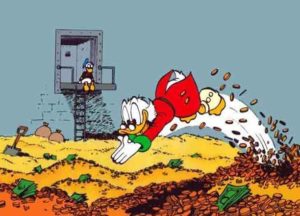 The economy is going through massive convulsions right now, as employers say they can’t find enough employees. Supply chains are disrupted and goods aren’t being delivered as the world runs out of dock works and truck drivers. Wait times for common goods and services are climbing quickly as not enough providers can be found. Wages are rising, and employees are demanding (and getting) concessions that would ‘ve been dismissed out of hand two years ago.
The economy is going through massive convulsions right now, as employers say they can’t find enough employees. Supply chains are disrupted and goods aren’t being delivered as the world runs out of dock works and truck drivers. Wait times for common goods and services are climbing quickly as not enough providers can be found. Wages are rising, and employees are demanding (and getting) concessions that would ‘ve been dismissed out of hand two years ago.
Much hay is made of how expanded govt unemployment assistance prevented people from seeking work, and how eviction moritoriums did the same. And yet, when the unemployment assistance went away, and the eviction moritorium was lifted, there was no increase in people seeking work, nor in eviction filings!
One of the things that puzzled me for many years is how the hell is it that we are so rich, while being so very poor. Even impoverished Americans (US Poverty line is $12,760/year for a single person) are well off by global standards (Global average is $10,300/year in 2018 per World Bank). People live on less than $20/day in many countries, but we can’t seem to make that happen, with our better tech and infrastructure?
The comparison is even more stark if we look at historical income. Most people lived as little more than subsistence farmers for most of humanity’s existence. The average American has a significantly better lifestyle than almost any Emperor or King that lived in pre-industrial times, in terms of both health and material comforts. And yet, they are struggling to get by, and certainly don’t feel “rich.” How is this happening?
Quite a bit of it is cost disease and additional expenses, sure. In many places in America it’s illegal to be poor, and excessive regulations and licensing make everything far more expensive. But a lot of this feeling of poverty is self-imposed. People’s expenses rise to match their incomes at all levels of life, and they don’t even realize it. Until something happens that forces them to drastically cut many expenses in a short time frame without reducing their income.
That happened last year, with COVID. Suddenly a lot of people had a large portion of their normal spending removed as the world locked down. Quite a few of those people continued to collect their regular income. Even those who didn’t, saw their savings going longer than anticipated. Over the course of a year of enforced Scrooge-ness, the entire country saw just how little money you really need to live in the US, if you opt out of many of the signalling games that are out there.
I’ve kept my expenses low my entire life. I upgraded my lifestyle a bit, as I moved out of the lowest tier of wage work, but stopped climbing that ladder before I hit the median US cost of living. I have a workhorse car that I keep maintained and won’t replace until it stops running. I live in a two-bedroom townhome that I share with a roommate. I don’t have children. I’ve made roughly the US median income my whole life, with a few rich years where I was making aprox 15% over the median. A few months ago, at 41, I retired*. I may have to work for The Man again some day, if things break unlucky, but not for quite a while.
A large percentage of the US work force was pushed into a similarly restricted lifestyle for a year, and they now realize that, actually, they are pretty damn rich. They don’t need to work nearly as much as they thought. A lot of them are opting to just not work anymore, or at least delay going back to work for a significant time as they live on savings/investments and hold out for less shitty work.
I think one of the lasting legacies of COVID will be the society-wide realization that actually, we’re pretty darn rich, and anyone who is willing to be content with a simpler life can translate that frugalness into a lot more time for themselves and their loved ones. They don’t have to work anywhere near as much, or as often, as they had thought.
(*not fully retired, I still do some work managing my investments. But it’s far less, and my hours are my own.)
First, congratulations on being semi-retired at 41, that is awesome!
And while a lot of what you are saying here makes sense. I’m curious why you think we did not see the same ten years ago during the Great Recession?
wow, congratulations! That’s an amazing feat.
For some reason, I had you pegged as younger, so I’m surprised to find you are 41, though not as surprised as to find you are retired.
I think this trend has been in the works for a while, but agree that covid is pushing a big acceleration. 5 years ago I had a boss retire young, in his ealry 40s, and no one really got it, everyone kept asking him what he was going to do (“work on my golf game”). I think, now, people would get it more.